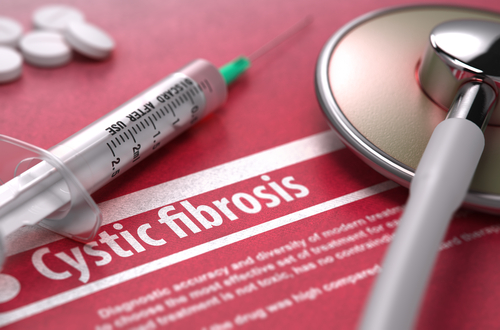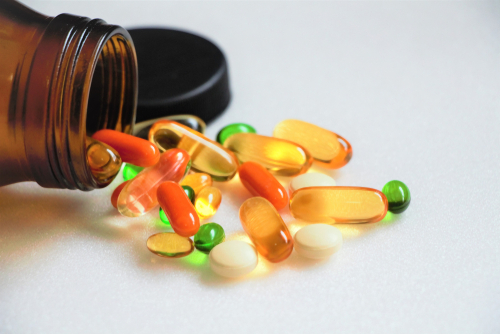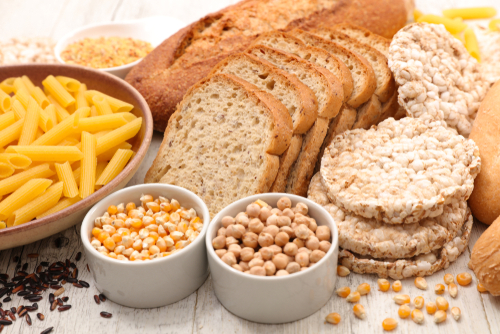
What You Need to Know About Fat Digestion and Digestive Enzymes
Carbohydrates, proteins, vitamins, minerals and water. What’s missing from this list of essential nutrients? Fats! An essential nutrient is one the body needs to function normally. However, the human body can’t make essential nutrients by itself. If you want to keep on keepin’ on, you must feed your body the fuel it needs to survive. Unfortunately, there are lots of illnesses that make it difficult or impossible for your body to digest these nutrients. This can cause malabsorption and malnourishment. Some of these are short-term problems that can be treated, while others are chronic conditions that need to be monitored throughout your life. In this overview, we’re going to take a look at both short- and long-term health issues that impact the way your body digests and uses the fats it needs to keep you working, living and enjoying life to the best of your ability. Plus, we’ll dig deeper into what you can do today to improve your fat digestion in order to stay happy and healthy.
Why Fat Digestion Is Important
Before we dig into what causes fat digestion problems, we need to understand why fats are so essential to your body’s most basic functions. After all, fats get a bad rap, but we can’t live without them. Why is that?
 Dietary fats, which are also called lipids, do a few different things. Primarily, your body uses them as an energy source. Short bursts of energy tend to come from burning carbohydrates. For more long-term energy, your body then begins burning fat. If your body can’t digest fat, you’re losing an energy source. You’ll find that your endurance flags and you become fatigued more easily. But that’s not all fats do. Like many other nutrients, they’re multi-taskers. Besides being an energy source, dietary fats contain essential fatty acids that humans cannot synthesize but are needed by the body to make molecules needed by the body to function properly. Also, dietary fats contain omega-3 fatty acids that have been shown to have benefits from reducing serum cholesterol to decreasing inflammation. So the proper digestion of dietary fats to obtain the essential fatty acids and omega-3 fatty acids is essential for good health. Fats keep your hair, skin and nails strong and supple. There are vitamins, including A, D, E and K, that are stored in your body’s fat cells. There are fatty acids that your body needs to take care of a variety of different activities, like clotting your blood and decreasing inflammation. They’re also an important building block in your brain. Did you know that 60 percent of your brain is made up of fat? It’s true! Your brain relies on fat to function. If your body isn’t absorbing fat properly, that will affect the way you think. It could also impact your future. Fat cells help protect the brain against debilitating diseases like Alzheimer’s and dementia. On top of all that, layers of fat around your body keep you warm and cushion your skeletal system and your organs. Just like the other essential micronutrients and macronutrients, fats are present all over your body. They are in your hair follicles and your fingertips, your brain and your biceps. They are necessary for innumerable processes that help you think, help you stand and help you go about your day, no matter what the day may bring your way.
Dietary fats, which are also called lipids, do a few different things. Primarily, your body uses them as an energy source. Short bursts of energy tend to come from burning carbohydrates. For more long-term energy, your body then begins burning fat. If your body can’t digest fat, you’re losing an energy source. You’ll find that your endurance flags and you become fatigued more easily. But that’s not all fats do. Like many other nutrients, they’re multi-taskers. Besides being an energy source, dietary fats contain essential fatty acids that humans cannot synthesize but are needed by the body to make molecules needed by the body to function properly. Also, dietary fats contain omega-3 fatty acids that have been shown to have benefits from reducing serum cholesterol to decreasing inflammation. So the proper digestion of dietary fats to obtain the essential fatty acids and omega-3 fatty acids is essential for good health. Fats keep your hair, skin and nails strong and supple. There are vitamins, including A, D, E and K, that are stored in your body’s fat cells. There are fatty acids that your body needs to take care of a variety of different activities, like clotting your blood and decreasing inflammation. They’re also an important building block in your brain. Did you know that 60 percent of your brain is made up of fat? It’s true! Your brain relies on fat to function. If your body isn’t absorbing fat properly, that will affect the way you think. It could also impact your future. Fat cells help protect the brain against debilitating diseases like Alzheimer’s and dementia. On top of all that, layers of fat around your body keep you warm and cushion your skeletal system and your organs. Just like the other essential micronutrients and macronutrients, fats are present all over your body. They are in your hair follicles and your fingertips, your brain and your biceps. They are necessary for innumerable processes that help you think, help you stand and help you go about your day, no matter what the day may bring your way.
Medical Conditions That Affect Fat Digestion
There are all sorts of illnesses that can influence the way your body digests nutrients. Here’s a shortlist of conditions most likely to prevent you from absorbing the fats you need for whole-body health from head to toe:
Parasites
A parasite is a type of organism that lives off a host, drawing nutrients from the host’s body and often depriving the host of the essentials it needs to survive and thrive. There are lots of different kinds of parasites that set up shop in the intestines and can cause malabsorption, including worms, spores and blastocysts. A stool sample can be used to diagnose a parasitic infection.
Inflammatory bowel diseases
IBD is an umbrella term for Crohn’s disease, ulcerative colitis and irritable bowel syndrome—all of which are chronic diseases that affect the large and small intestines. The longer the trio goes untreated, the more damage they can do to the lining of your intestines, which is what allows you to absorb essential nutrients. A GI doctor will be able to diagnose you through symptom assessment, blood tests and an endoscopy or colonoscopy.

Cystic fibrosis
Cystic fibrosis is well-known for devastating the respiratory system, but it can also impact other body systems as well, including the GI tract. CF affects the way salt and water move in and out of cells, creating lots of mucus. The pancreas, which secretes the digestive enzyme lipase that breaks down fat, is overwhelmed by mucus. That means many people with cystic fibrosis struggle to absorb fats as well as fat-soluble vitamins.
Food intolerances and sensitivities
An intolerance or a sensitivity to certain foods is often caused by the body not producing the digestive enzyme that breaks down a certain nutrient. In the case of lactose intolerance, the body doesn’t create enough lactase, which is an enzyme that breaks down milk sugar into simpler carbohydrates.
Celiac disease
There are wheat and gluten sensitivities, and then there is celiac disease. Celiac is an autoimmune disease like rheumatoid arthritis, which means that the immune system attacks a part of the body when a trigger is present. In the case of celiac disease, the immune system damages the small intestine when gluten is ingested. If the damage continues, the small intestine can’t absorb nutrients, including fats, which can lead to malnutrition in addition to other GI symptoms.
Chronic pancreatitis
Inflammation of the pancreas can be a one-off illness, or acute, as well as a continual condition that gets progressively worse, or chronic. Chronic pancreatitis slowly destroys the pancreas and inhibits its ability to produce digestive enzymes, including lipase. Nutrition assistance and digestive enzyme supplementation is hugely important for pancreatitis patients.
Liver and gallbladder diseases
The pancreas isn’t the only player when it comes to digesting fats. In order to be absorbed from the intestines into the bloodstream, the fat molecules are encased in a substance called bile. Bile is produced by the liver and stored in the gallbladder, so diseases affecting either organ can affect the way a body is able to use fat.
Congenital defects
Fat absorption isn’t relegated to one organ or process. As you can see from the varied list of diseases above, there are so many ways digestion can be disrupted. It doesn’t have to be caused by illness, either. A congenital defect that a person is born with in almost any organ can affect how the body can use essential nutrients, including fat. Defects in the intestines, where nutrients are broken down and absorbed, are of primary concern. The same goes for defects in the pancreas, liver and gallbladder, which are important when it comes to the enzymes and bile that are essential to the fat digestion process.

Genetic diseases
There are uncommon hereditary diseases that in some way limit fat digestion. Whether they affect the digestive system directly, the nervous system or another area of the body entirely, researchers have made conclusive connections between these conditions and nutrient absorption. These genetic diseases include:
- Gaucher disease
- Tay-Sachs disease
- Abetalipoproteinemia
Rare diseases
Scientists and doctors are continually learning more about diseases they don’t see frequently. Some are more prevalent outside of the United States, while others are common in certain climates or areas of the world. These rare diseases include:
- Whipple disease
- Tropical sprue
- Short bowel syndrome
Medications and Treatments That Could Affect Fat Digestion
It’s not just your body that can throw off your fat digestion. The meds you take to heal your body and offset symptoms of other illnesses can negatively affect your nutrient absorption, too.

Extended use of antibiotics
Antibiotics are at the top of the list. Even a single course of antibiotics can throw off your digestive system, though it takes long-term use to cause enough malabsorption. Not only do antibiotics get rid of the bad bacteria present in your gut, but they also destroy the good bacteria necessary to help with digestion. Probiotics can help restore your gut flora after occasional antibiotic use, while a digestive enzyme supplement can help with fat digestion and keeping your digestive system on track.
Radiation therapy
For people fighting cancer, radiation therapy has become a go-to treatment. It’s a lifesaver, but it can also cause other health problems. Among these problems are damage to the intestines and nutrient malabsorption.
How Digestive Enzymes Help Your Body Digest Fats
There are dozens of ways your body’s fat digestion can be thrown off course. The digestive system is complex. It withstands a lot—just think about all the different types of foods and drinks you can throw its way with nary a problem! However, it’s not all-powerful.
 Digestive enzymes are proteins that break down the food you eat into essential nutrients that your body can use. The more help your body is given during the process of digestion, the easier it is for it to absorb and use these nutrients—and, in some cases, help you look and feel better and heal more quickly. From congenital defects to chronic diseases to medications used to treat other illnesses, there are so many things that can throw a wrench into the way your GI tract works and how successfully it’s able to digest the food you eat. Many of these wrenches impair your body’s ability to produce the quantity of digestive enzymes you need to break down the food you eat and absorb its nutrients. When your body isn’t producing enough of these enzymes on its own, a digestive enzyme supplement can be added to your daily nutrition plan to help boost your nutrient absorption. There are different enzymes that break down different types of food. If you’re having trouble digesting fats, for example, adding a supplement that includes the digestive enzyme lipase will help improve fat digestion and nutrient absorption.
Digestive enzymes are proteins that break down the food you eat into essential nutrients that your body can use. The more help your body is given during the process of digestion, the easier it is for it to absorb and use these nutrients—and, in some cases, help you look and feel better and heal more quickly. From congenital defects to chronic diseases to medications used to treat other illnesses, there are so many things that can throw a wrench into the way your GI tract works and how successfully it’s able to digest the food you eat. Many of these wrenches impair your body’s ability to produce the quantity of digestive enzymes you need to break down the food you eat and absorb its nutrients. When your body isn’t producing enough of these enzymes on its own, a digestive enzyme supplement can be added to your daily nutrition plan to help boost your nutrient absorption. There are different enzymes that break down different types of food. If you’re having trouble digesting fats, for example, adding a supplement that includes the digestive enzyme lipase will help improve fat digestion and nutrient absorption.
What to Do if You’re Having Trouble Digesting Fats
Malnutrition and malabsorption show up in the way you look and feel every day. Even if you’re just feeling a little “off,” you should make an appointment to talk to your general practitioner, a gastroenterologist or a specialist you’re seeing already to manage a chronic condition. The faster you combat digestion problems, the more quickly you can solve them without doing your body any long-term damage. Your fix could be as simple as adding a digestive enzyme supplement to your diet. Talk to your doctor before you make a change. A nutritionist can also help get your digestive system back on track.




